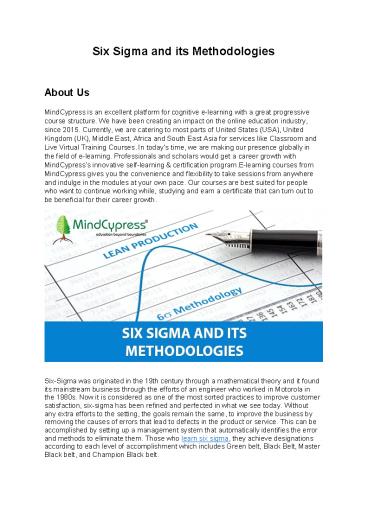Six Sigma and its Methodologies - PowerPoint PPT Presentation
Title:
Six Sigma and its Methodologies
Description:
Six-Sigma was originated in the 19th century through a mathematical theory and it found its mainstream business through the efforts of an engineer who worked in Motorola in the 1980s. Now it is considered as one of the most sorted practices to improve customer satisfaction, six-sigma has been refined and perfected in what we see today. – PowerPoint PPT presentation
Number of Views:62
Title: Six Sigma and its Methodologies
1
Six Sigma and its Methodologies About Us
MindCypress is an excellent platform for
cognitive e-learning with a great progressive
course structure. We have been creating an impact
on the online education industry, since 2015.
Currently, we are catering to most parts of
United States (USA), United Kingdom (UK), Middle
East, Africa and South East Asia for services
like Classroom and Live Virtual Training
Courses. In todays time, we are making our
presence globally in the field of e-learning.
Professionals and scholars would get a career
growth with MindCypresss innovative
self-learning certification program.E-learning
courses from MindCypress gives you the
convenience and flexibility to take sessions from
anywhere and indulge in the modules at your own
pace. Our courses are best suited for people who
want to continue working while, studying and earn
a certificate that can turn out to be beneficial
for their career growth.
Six-Sigma was originated in the 19th century
through a mathematical theory and it found its
mainstream business through the efforts of an
engineer who worked in Motorola in the 1980s.
Now it is considered as one of the most sorted
practices to improve customer satisfaction,
six-sigma has been refined and perfected in what
we see today. Without any extra efforts to the
setting, the goals remain the same, to improve
the business by removing the causes of errors
that lead to defects in the product or service.
This can be accomplished by setting up a
management system that automatically identifies
the error and methods to eliminate them. Those
who learn six sigma, they achieve designations
according to each level of accomplishment which
includes Green belt, Black Belt, Master Black
belt, and Champion Black belt.
2
- Major aspects of Six Sigma
- In an effort to bring the operations to Six
Sigma, there are 3.4 defects for every one
million opportunities and this methodology calls
for continuous efforts to get the process to the
point where they produce stable and predictable
results. While deconstructing the manufacturing
process, Six Sigma defines and explains each step
of the process while searching its way to
improve efficiency in business structure to
improve the quality of the process and increase
the bottom line profit. While going towards the
end, the methodology calls for the training of
the individual's expert in six- sigma which
includes beginner Green Belts and black belts and
other subordinates then master black belts. The
ultimate goal of the six-sigma is to improve
efficiency and Motorola reported to have saved
17billion using only six-sigma methods. - Six Sigma Methodologies
- In total, there are two major methodologies of
Six Sigma, which are composed of five sections.
DMAIC This method is used majorly for improving
existing business processes. The letters stand
for - Define the problem and the project goals
- Measure the minute details of every aspect
- Analyze data to find the root cause
- Improve the process
- Control how the process is done in future
3
- DMADV This method is used to create the new
process, product, and services - Define the project goals
- Measure critical components
- Analyze the data
- Design and test details of the process
- Verify the design by running simulations
- Another method to measure the root cause of the
problem is five Whys. The method is quite
simple, by simply stating the problem like the
car wouldn't start because of which I wasn't
able to go to office today. Ask yourself the
question, why the car didn't start, because I
didn't properly maintain the car, or I need to
leave early to avoid any issues, this process
was first originated by Toyota. - MindCypress will help you with the training.
Contact us today! - Resource https//blog.mindcypress.com/p/six-sigma
-and-its-methodologies






























![get [PDF] Download Unlocking Lean Six Sigma: A Competency-Based Approach to Applying Conti PowerPoint PPT Presentation](https://s3.amazonaws.com/images.powershow.com/10100592.th0.jpg?_=202408161110)
![get [PDF] Download Unlocking Lean Six Sigma: A Competency-Based Approach to Applying Conti PowerPoint PPT Presentation](https://s3.amazonaws.com/images.powershow.com/10102752.th0.jpg?_=20240820045)